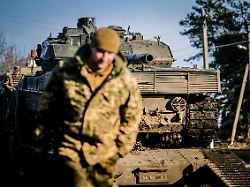Another Minsk Agreement?
Heusgen: “It shouldn’t end like it did in the First World War”
February 8, 2024, 7:47 a.m
Listen to article
This audio version was artificially generated. More info | Send feedback
Angela Merkel’s former advisor, Christoph Heusgen, is counting on a negotiated solution to the Ukraine war, even if there is little to suggest it. He defends the much-maligned Minsk Agreement, which once gave hope for peace – and quickly failed.
To end the war in Ukraine, the head of the Munich Security Conference, Christoph Heusgen, is relying on a negotiated solution – also based on the failed Minsk Agreement. “It shouldn’t end like it did in the First World War, with hundreds of thousands of deaths. It is therefore right that we consider how we can reach a negotiated solution,” said Chancellor Angela Merkel’s long-time foreign policy advisor to the newspapers of the Funke media group. “And I think you can certainly use the Minsk Agreement as a guide.”
Heusgen referred to statements by the Ukrainian commander-in-chief of the armed forces, Valery Saluschnyj, according to which there was a stalemate at the front like on the Western Front in the First World War. The Minsk Agreement was concluded in 2015 between Russia and Ukraine in the Belarusian capital under German-French mediation. The aim was to pacify the east of Ukraine, which was already under Russian influence at the time. However, most of the commitments were never implemented. Russia and Ukraine blame each other for this.
Heusgen now said that he believes it is unjustified that the Minsk Agreement has a bad reputation. It is as good or bad as the Budapest Memorandum of 1994, in which Russia guaranteed the territorial integrity of Ukraine, among others, or the United Nations Charter. “Putin kicked all three into the trash, but that doesn’t make them bad. Putin is bad because he doesn’t adhere to international law.”
Little prospect of peace
In this context, however, the question arises as to why Putin should stick to a negotiated solution in the long term if he was of little interest in past agreements. Many experts warn that the Russian armed forces could reposition themselves in a “peace phase” in order to then strike with greater strength later. The Kremlin has massively ramped up the country’s arms production.
There is currently little to suggest a ceasefire or peace talks. All leading Russian politicians have confirmed in recent weeks that they want to achieve the country’s war goals. On the other hand, Ukraine still strives to liberate its entire territory from the occupiers.
Heusgen continued: “I definitely believe that Ukraine will emerge as the winner at the end of this terrible war.” It is important that Putin does not win. His goal was to wipe out Ukraine’s statehood and depose the government in Kiev. He shouldn’t be able to do that. “He also wants to prevent the Ukrainians from freely deciding whether they want to become a member of the EU and NATO. Putin must not get his way here either.”
Melnyk: Minsk a “rotten compromise”
In late December, a report in The New York Times received greater attention saying that Putin had been signaling “through intermediaries at least since September” that he was open to a ceasefire that would freeze fighting along the current front.
The US Institute for War Studies (ISW) then warned against such offers if they really existed. In an analysis, the researchers pointed to the Kremlin’s “mostly near-constant public signaling of Russia’s maximalist goals in Ukraine.” War researchers are wary of the assumption that Putin’s peace offers through intermediaries “reflect his thoughts and wishes more accurately than the rhetoric that he and other Kremlin officials repeatedly express publicly.”
Ukraine’s former ambassador to Germany, Andrij Melnyk, recently said in an interview with ntv.de: “You need a sophisticated strategy, a common denominator, which of course also has to be closely coordinated with Ukraine, because a new rotten compromise like in Minsk We certainly don’t need it.”
In this context, he referred to “strong signals in a geopolitical sense. Even after this war, Russia will probably not have disappeared. One topic could be Russia’s role after the end of the war – Putin shouldn’t be completely indifferent to that.”
Melnyk would like “the diplomatic sticks to be brought out now. President Zelensky has brought a peace formula into play on which such an initiative could be built. At the moment we read almost every day that Putin is sending out signals through some mediator, that he is ready for talks, that he supposedly wants to end the war.”
